* Angélica Cárcamo / Norma Ramírez - ARPAS
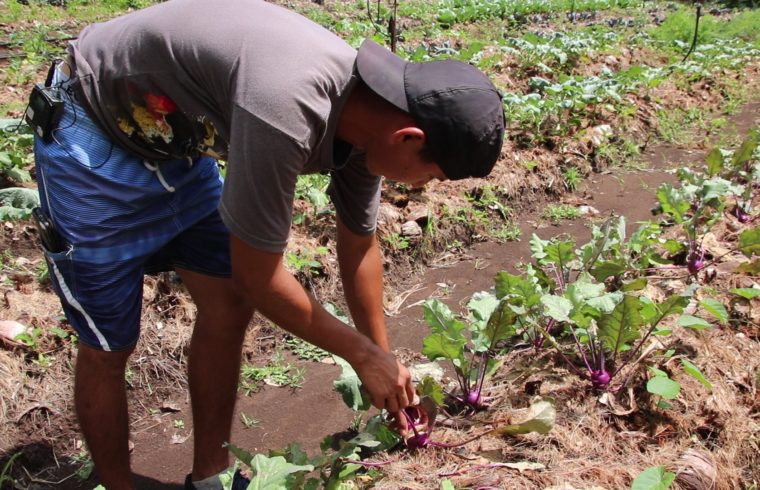 In 2000, the Pacific Rim mining company intended to employ 450 families in the Department of Cabañas, north of El Salvador. Although the mining project was in its exploration phase, the company closed its facilities in 2017 due to the approval of the Law prohibiting metallic mining. Following the expectations of a local sector to improve the living conditions of the area, local organizations began training processes in organic agriculture. Through these activities, more than 1,000 families have been trained during the last seven years. Currently, 250 families are active in the production of home gardens for family consumption and 25 are able to produce for local sales. For the participants in these initiatives, this type of process has improved family finances as well as diversified their nutritional intake.
In 2000, the Pacific Rim mining company intended to employ 450 families in the Department of Cabañas, north of El Salvador. Although the mining project was in its exploration phase, the company closed its facilities in 2017 due to the approval of the Law prohibiting metallic mining. Following the expectations of a local sector to improve the living conditions of the area, local organizations began training processes in organic agriculture. Through these activities, more than 1,000 families have been trained during the last seven years. Currently, 250 families are active in the production of home gardens for family consumption and 25 are able to produce for local sales. For the participants in these initiatives, this type of process has improved family finances as well as diversified their nutritional intake.
Twenty years ago, Carmen Aquileo Torres still had dark hair and no wrinkles on his face. When the Pacific Rim mining company arrived in the department of Cabañas, Torres was excited about the possibility of improving his living conditions. "At some point, the company caught our attention, their representatives came to our communities and showed videos on giant screens where they explained how they were going to work," he says with a smiling look.
Since his childhood Carmen or "Carmelo", as his neighbors call him, has been growing beans, rice, and sorghum in El Junquillo, his native village, in the municipality of San Isidro. This municipality is characterized by having clay soil and difficult to work for the production of vegetables and legumes. “In these places, we have no other way to survive. If we do not work on agriculture we are left hungry because we do not have access to other jobs”.
For this reason, when representatives of the Pacific Rim mining company spoke about the benefits of mining, the local inhabitants thought their problems would be solved: "they (representatives of the company) went around in the communities to talk about the project that would benefit the local population, those who would have had the opportunity to work and earn a little money, at least".
However, after learning how metal mining affected the environment in other countries, Torres´ perspective changed: “Pacific Rim talked about green mining. But we saw that the company was going to benefit from the profits and we were going to be left with the damages to the environment. The money that was going to be earned (…) through the employment of the locals, would be nothing compared to the illnesses that the extractive projects would have brought”.
Interview with Carmelo Torres, farmer in El Junquillo community, Guacotecti, Cabañas
Most of the inhabitants of the El Junquillo community manage to study only up to the sixth grade of primary education and then, they dedicate themselves to cultivating basic grains or the production of poultry to survive. The rest of the inhabitants decide to migrate. In fact, most of the locals have at least one relative living and working in the United States.
El Junquillo belongs to the municipality of San Isidro, which together with Guacotecti and Sensuntepeque, made up the area in which the exploitation of gold and silver was planned within the boundaries of the El Dorado Mining project. Data from the National Roundtable Against Metallic Mining for 2005 revealed that the mine was projected to exploit 18 million grams of gold and 85 million grams of silver.
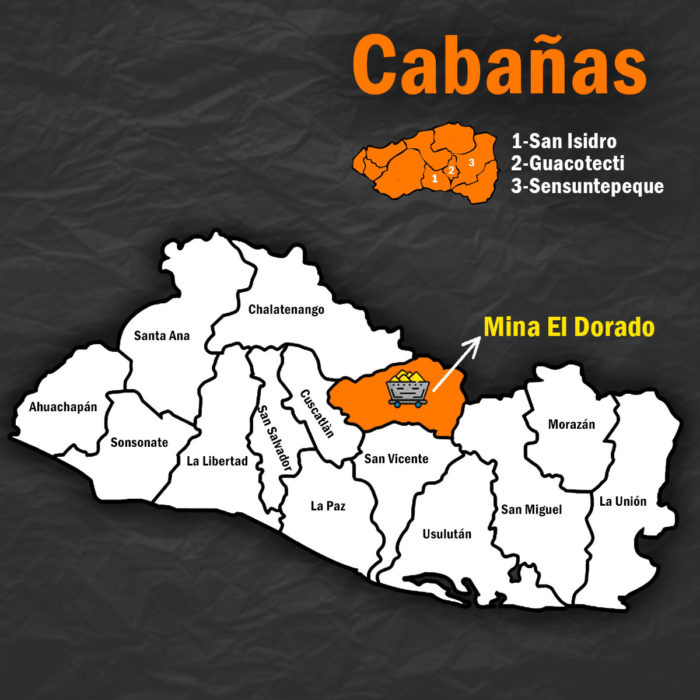 Cabañas is located in northern El Salvador. The El Dorado mine, the property of Pacific Rim/OceanaGold, projected to exploit 18 million grams of gold and 85 million grams of silver.
Cabañas is located in northern El Salvador. The El Dorado mine, the property of Pacific Rim/OceanaGold, projected to exploit 18 million grams of gold and 85 million grams of silver.
But the Salvadoran Congress approved, in March 2017, a law that prohibited metal mining, the only regulation of its kind in the world. With this law, no company can extract gold, silver, copper, or other metallic minerals.
Article 2 of the Law prohibiting metallic mining established that the Salvadoran State should carry out actions of support, advice, technical and financial assistance for those who engaged in artisanal mining, to transform the sector within a period of two years.
With the promulgation of the aforementioned law, the El Dorado mine closed operations in September 2017 and the Pacific Rim company – by then owned by OceanaGold - terminated the employment contract of more than 80 local employees who worked in the administrative department, social programs, research and geological analysis of the area.
To date, the law only specified the prohibition of metallic minerals, but no support has been generated to provide for alternative, sustainable development initiatives for the local economy of the communities.
Despite the fact that Carmelo lost the opportunity of having a job in the mining company, his life in agriculture would change in the following years.
Alternatives to metal mining
In 2014, the Association for Economic and Social Development (Asociación para el Desarrollo Económico y Social, ADES in its Spanish acronym), a community organization located in Cabañas, began promoting organic agriculture in the area. Antonio Pacheco, executive director of ADES, said that the mining projects had also caught their attention: “everyone, including us, thought that mining was an alternative to generate employment and improve the living conditions of the population, we never imagined that it could mean a risk for farming families”.
According to Pacheco, organic agriculture is an alternative to mining projects: “If you don't want an activity that pollutes the environment, this is the best way to do something to protect it, it allows you to obtain a healthy harvest, and that will not endanger your health.
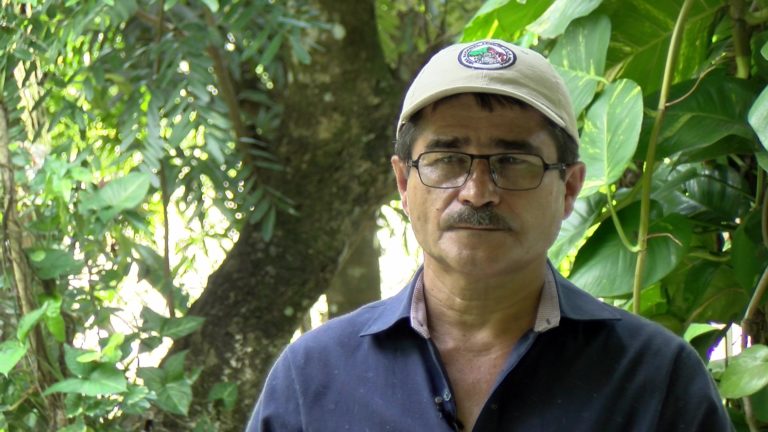 Antonio Pacheco, Executive Director of ADES explains that the organization aspires to promote agroecology as a sustainable and viable alternative in municipalities that were designated as mining districts.
Antonio Pacheco, Executive Director of ADES explains that the organization aspires to promote agroecology as a sustainable and viable alternative in municipalities that were designated as mining districts.
Carmelo was one of the farmers who received training to create his home garden, with a smile from ear to ear, he shows what he has managed to produce “There are chives, tomatoes, spinach, ginger, and lemongrass; but what we are betting for is the planting of tomatoes, sweet chili peppers and we also have radish seed, for what we are already preparing the beds for planting ”.
The organic agriculture training processes began in 2014. According to data provided by ADES, to date they have trained more than a thousand families in agroecological practices in the municipalities of San Isidro, Guacotecti and Sensuntepeque. The investment amounts to $350 thousand dollars that have been financed through international develoment cooperation with organizations such as DKA Austria, the American Jewish Service, the Kenoly Foundation of Canada, and the Canadian embassy. At the local level, ADES has made alliances with the Movement of Organic Agriculture of El Salvador (MAOES). ”.
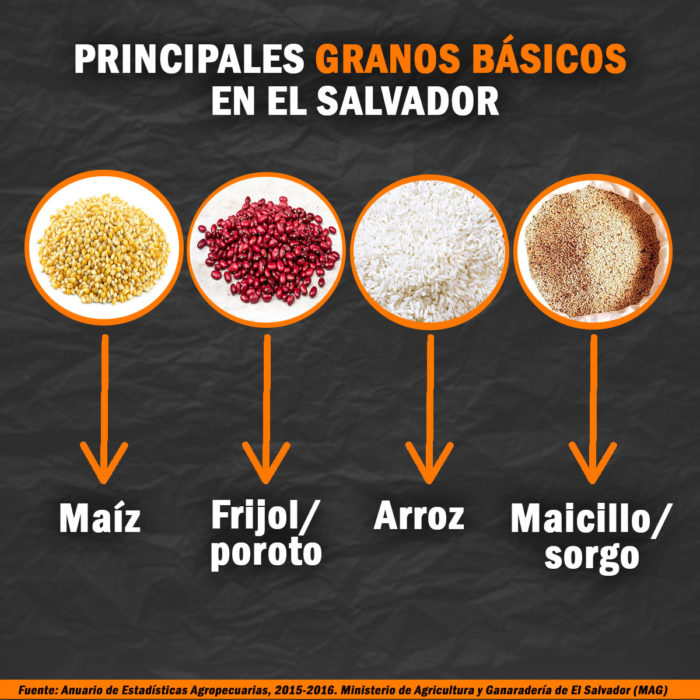 Basic foodstuffs produced in El Salvador are beans, corn, rice, and sorghum according to data from the Ministry of Agriculture and Livestock Farming (MAG).
Basic foodstuffs produced in El Salvador are beans, corn, rice, and sorghum according to data from the Ministry of Agriculture and Livestock Farming (MAG).
The El Zacamil farmhouse is located 5 kilometers from the urban area of Guacotecti. Here is where María Dubón has dedicated her time to organic agriculture initiatives for three years. To get to her house you must walk at least 30 or 40 minutes, there is no public transport in the area and private vehicles cannot travel because the street is under repair.
María, a retired teacher, says that her family traditionally produces basic grains because the soil has an abundance of clay, which makes it difficult to grow other types of food. “We used to grow corn, beans and maicillo (sorghum) with chemical fertilizer. But we saw that these chemicals, instead of improving the earth, destroy it. By employing that kind of fertilizer, the soil is ruined, it becomes hard. On the contrary, by utilizing organic compost the land is being repaired and the soil fertilized,” she said.
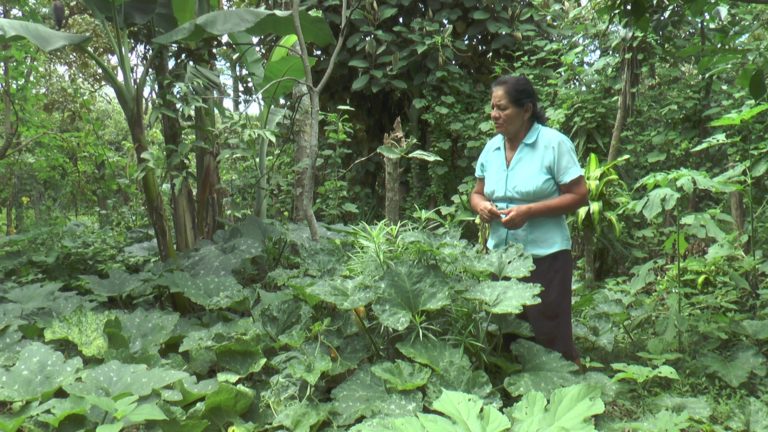 In the community of El Zacamil, Cabañas, María Dubón shows her plantación of squash(calabaza), one of the vegetables she grows on a 6-acre farm. Her home is used as an experimental field for organic agriculture
In the community of El Zacamil, Cabañas, María Dubón shows her plantación of squash(calabaza), one of the vegetables she grows on a 6-acre farm. Her home is used as an experimental field for organic agriculture
Dubón mentions that ADES came to her community to train them in soil improvement. “A technician came and showed us how to make Bokashi compost (an organic compost rich in nutrients) that contains leaves, cow manure, ash, lime, yeast… It has many things. We knew how to cultivate the land, but the organic methods that they have taught us are better compared to the traditional ones”, she commented.
When Dubón began to use the techniques she had learned, she managed to diversify the production of food, which helped her to use her land as a demonstration plot. Her project has even received support from the World Food Program (WFP). “I had never grown cabbage; nor lettuce, tomato, güisquil (chayote) plants, and even some mango trees (…). The WFP also gave us a Tambo (water tank) to build irrigation systems."
Omar Arriola, a technician at the Food and Agriculture Organization of the United Nations (FAO), mentions that they have promoted the production of family agriculture in El Salvador for 10 years as a way to guarantee food and support small producers who rely less on external chemical-based products:
“(With organic agriculture) we have a cleaner production, everyone can participate in farming at home, there is no difficulty for the mother, father and older children to work and they have no risk that they can be contaminated by the products they are using or be exposed to toxins found in farms. We eliminate those toxic substances and the benefits to health and to the community are certain”.
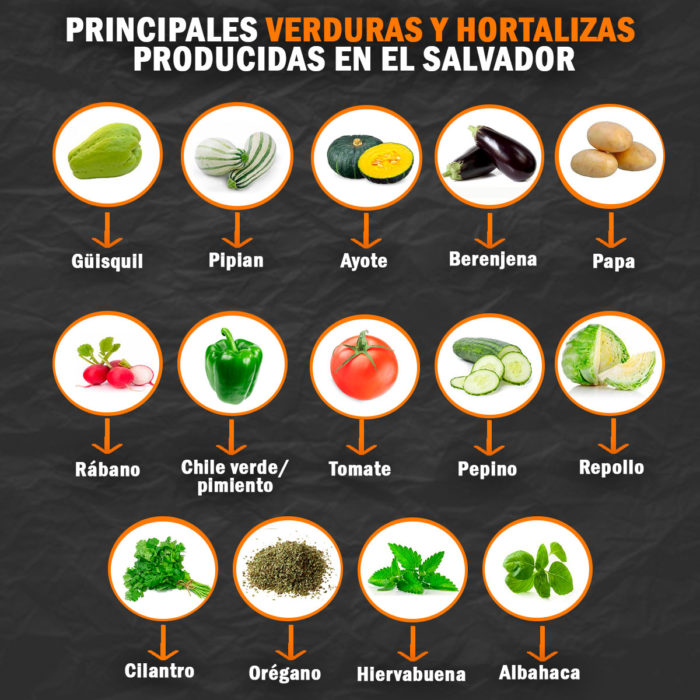 Despite of the poor soil conditions and hot temperatures, families trained in San Isidro, Guacotecti and Sensuntepeque have managed to grow vegetables with the help of organic agruculture techniques.
Despite of the poor soil conditions and hot temperatures, families trained in San Isidro, Guacotecti and Sensuntepeque have managed to grow vegetables with the help of organic agruculture techniques.
To the west of Guacotecti we find the Reyes Membreño family. There, Haydee and her partner Juan, have been engaged in agriculture for 18 years, and in the last seven, they have grown organically, both for family consumption and for sale to their neighbors and inhabitants of other municipalities of Cabañas.
The Reyes Membreño family has managed to transform their mid-scale farm from traditional to organic agriculture, their production allows them to sell their products in different communities in Cabañas.
“All this here was wilderness, there was nothing, maybe an Indian lemon tree, when I moved in with him (Juan),” says Haydee. Her partner worked as a security guard and left his position due to the lack of timely payment of his salary, added to the risk of being a security employee. In El Salvador, this work involves a high risk of threats, physical attacks or even death by gangs.
"(At the beginning) I was worried about my choice. I worked as a security employee in the Ministry of Education, but the payment was not regular (...) when I left that job I said 'my partner is going to leave me'; but thank God I started to make the first eras (blocks of land separated with living barriers) and we started selling and we liked it”, said Juan.
Juan explains that they were interested in organic agricultural production but had no training to do it, it was until 2014 that he began to receive support from various institutions: “Unfortunately when I started it was with chemical fertilizers (…). Thank God ADES and Trocaire asked me and these bichas (ladies) what kind of help we needed”, he mentions.
Haydee comments that after receiving the training, her land began to improve, and currently they produce what is necessary to sell all year round: “we are producing radish, chives, eggplants, coriander, we have fruit trees. Before we did not have all these fruit trees, now we have guavas, jocote (a type of local cherry), lemon, myrtle, cocoa, orange, mango, soursop, tangerine, medlar. Indeed, I have felt that it is a great blessing to produce organic products”, she emphasized.
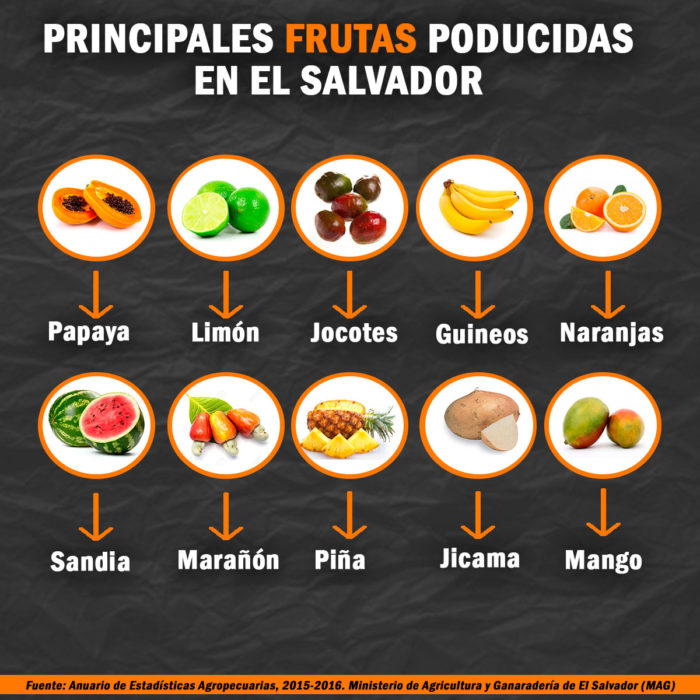 Fruit provides a high content of minerals and vitamins. Orgánic production promotes chemical-free products for the consumer.
Fruit provides a high content of minerals and vitamins. Orgánic production promotes chemical-free products for the consumer.
Lourdes Molina, senior economist and specialist in ecological economics at the Central American Institute for Fiscal Studies (Instituto Centroamericano de Estudios Fiscales, ICEFI for its Spanish acronym), suggested that organic agriculture initiatives in the area of Cabañas contribute to the construction of economic alternatives that allow families to secure their daily livelihood. "To the extent that these initiatives can be replicated and scaled, and have greater coverage, they can have positive impacts on the population", said the specialist.
María Luisa Torres lives in El Junquillo, a few meters from Carmelo, in an area where crickets can be heard and the shade of the trees hardly allows you to see her humble home built with adobe and tile, and a dirt floor. María Luisa and her two young children live there, she has no education, she does not have a formal job and the only way to subsist is through agriculture.
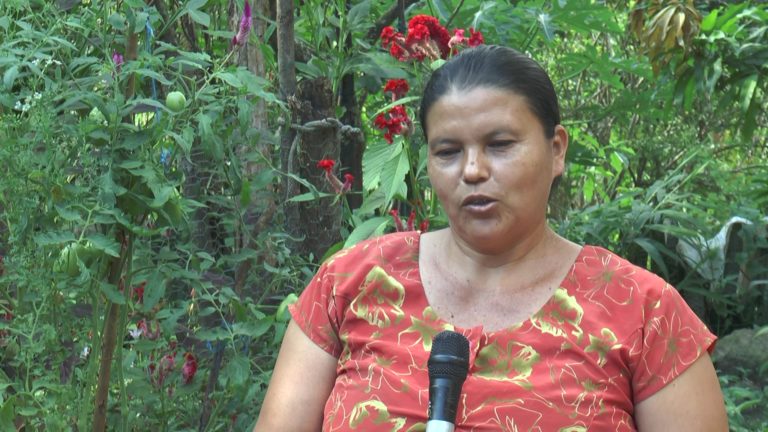 With the production of vegetables at home, María Luisa is able to afford other types of foods, like meat.
With the production of vegetables at home, María Luisa is able to afford other types of foods, like meat.
For this reason, when she learned about the organic agriculture projects in the area, she did not hesitate to accept the invitation to participate in the training. As she retells, “when I started learning, we prepared a fertilizer for the plants called Bokashi. We later, began to work use to fertilize the plants. For me that was the beginning of my work with organic agriculture”.
Marvin Pineda, a technician in organic agriculture at ADES, mentions that one of the main bets is to train families to opt for a sustainable agriculture model “what does that mean? Teach a family to produce with resources or materials that they have in their own plot of land, giving a sustainability approach so that they do not depend on products external to the community. We are teaching them to reproduce their own seeds, instead of buying supplies from agro service stores, which today are particularly expensive due to the Covid 19 pandemic ”.
In the case of the Reyes Membreño family, their quality of life improved considerably. "Even if they tell me that they are going to pay me $ 20.00 a day to go to work, I no longer go, because I know that with my wife we will secure the same amount" Juan expressed. Moreover, he adds that: "I lived in a little ranch, through what little I have been doing, I have been fixing it. If I had spent on chemical fertilizers (as part of the practices of traditional agriculture), I would not have been able to do this, because I would be spending money on the chemicals used to grow the vegetables”.
For María Dubón, one of the most important parts is saving, as she no longer spends money on buying vegetables, basic grains and legumes. When asked what do you buy with the money saved she answers: “Medicine. My mother was operated on the throat for a tumor, and the money saved helps us because we take her to a private doctor every month”.
According to the 2019 Survey of Households and Multiple Purposes (Encuesta de Hogares y Propósitos Múltiples, EHPM in its Spanish acronym) of the Ministry of Economy, the department of Cabañas has a population of 171,873 inhabitants of which 16% live in illiteracy and its unemployment rate is 7.3%, one of the highest figures compared to the rest of the country.
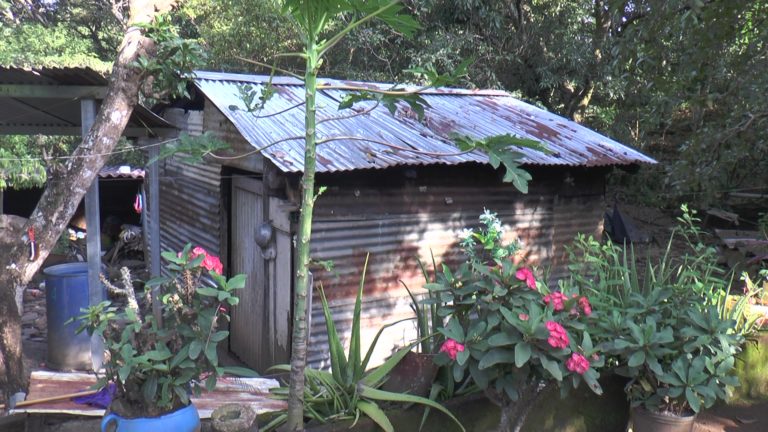 Most houses in rural Cabañas are built with adobe (mud bricks) or zinc sheets. At 82%, it has one of the lowest literacy rates in the country.
Most houses in rural Cabañas are built with adobe (mud bricks) or zinc sheets. At 82%, it has one of the lowest literacy rates in the country.
For this reason, for Sofía Ramírez, a nutritionist at the Basic Comprehensive Health System of Cabañas (Sistema Básico de Salud Integral, SIBASI in its Spanish acronym), the commitment to organic agriculture allows improving the living conditions of its inhabitants and has a positive impact on nutrition.
"It is not only beans and rice, now there are also vegetables such as tomato and green peppers, and the benefit is that each family knows how they are growing it, they know that they have not applied pesticides to them". Ramírez also adds that "it is an excellent initiative to have this organic agriculture for families and at the community level to move the communities forward in terms of nutrition and to improve the local economy; because all communities can help each other, sell among themselves and thus share good nutrition.
In this regard, María Luisa comments that the money saved with the surplus production of her home garden allows her to have access to other types of food “because beans are boring, you have to vary from time to time, you have to buy a piece of chicken, or a pound of meat,” she said laughing.
Organic agriculture in the face of Covid-19
On March 14, 2020, the Salvadoran government announced a mandatory home quarantine that ended in mid-June. The measure forced the inhabitants to remain locked in their homes and, in those cases in when being out was not justified to buy food, medicine or attend an emergency, the Government, through the police and the military, transferred them to containment detention centers where they had to complete the mandatory quarantine.
Although the measure was more rigid in urban areas, in rural areas one of the main concerns was access to food since most agricultural production is focused on basic grains. Although the government promised a bonus of $ 300.00 to each representative of the household as well as food baskets, not all families received those forms of help.
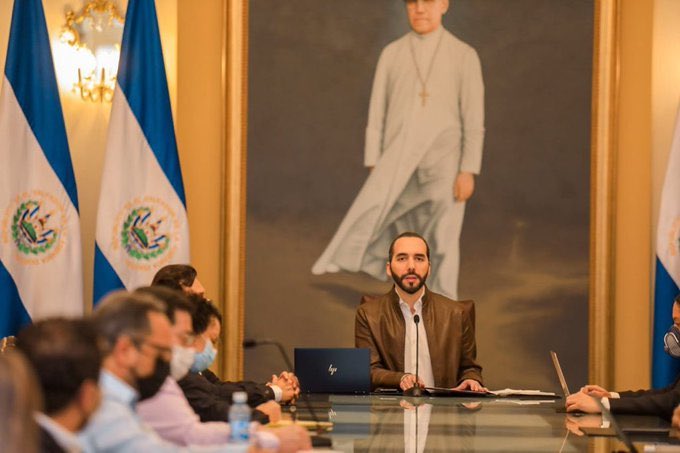 President Nayib Bukele implemented a compulsory for more than three months. One of the impacts was the lack of access to fresh healthy food.
President Nayib Bukele implemented a compulsory for more than three months. One of the impacts was the lack of access to fresh healthy food.
Alison Jovel, a 21-year-old girl from the El Zacamil community in Guacotecti, had visited María Dubón's demonstration plot. Given the impacts of the pandemic, María and ADES are looking for support to provide start-up supplies and support her to produce her own vegetables:
“When the pandemic came, it was difficult because the quarantine came. It was even more complicated to access vegetables because the vegetable vendors did not come. Moreover, you could not go out due to all the restrictions that were in place. This is when one takes the initiative to produce”, said the young computer science graduate.
She comments that after buying tomatoes and sweet peppers, she took the seeds out of them, planted them, and realized that it was possible to grow plants in her garden. "I went to ask ADES for seeds so that the rest of the community would do the same, taking advantage of the fact that we do have the necessary resources, space, and everything else."
For her part, Jacqueline García, a 22-year-old young woman, joined Alison's initiative and started her home garden, in a 6 square meter space. She said that she started with the support of ADES as well as watching tutorials on youtube.
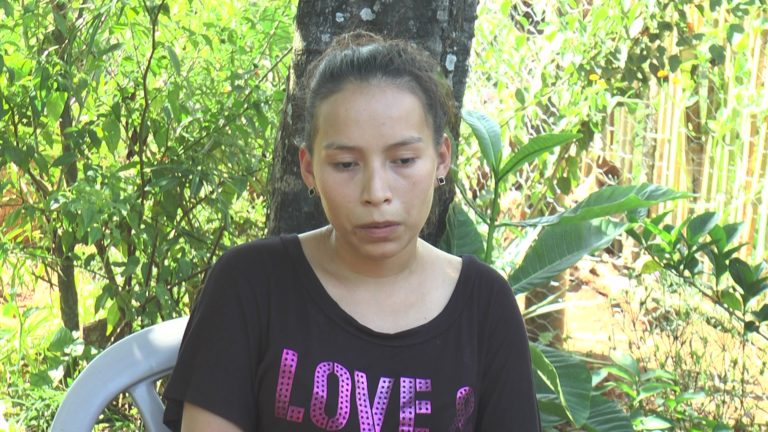 Jacqueline García aspires to grow a vegetable garden at home to sell her products locally. For her, organic agriculture is an employment option.
Jacqueline García aspires to grow a vegetable garden at home to sell her products locally. For her, organic agriculture is an employment option.
“When the pandemic hit, the family became more united and (…) I really liked the initiative to start farming. I started with a tomato seedbed, then I started to take care of it and when it bloomed I liked it a lot, (the same) when the vegetable production started ”, reflects García, who today harvests tomatoes, jalapeño peppers, cabbage, and aromatic herbs.
Unlike other rural areas, the El Zacamil village has an internet signal, which made it possible to create a WhatsApp group so that young people could consult the agro-ecologists who train them.
For the ADES technician, Marvin Pineda, the pandemic accelerated the training processes in organic agriculture in the municipalities of San Isidro, Sensuntepeque and Guacotecti.
"A pandemic has been necessary to teach us that we had to sow, even if it was a tomato plant. The pandemic is difficult (...) for that reason, agriculture should be something fundamental for the human being. Without agriculture, there is no food."
The challenges of the Salvadoran State
Although the organic agriculture projects promoted by ADES have helped more than 1,000 families in the municipalities of San Isidro, Guacotecti and Sensuntepeque, with the support of international organizations such as the WFP, the role of government institutions is still little or nonexistent.
The law prohibiting metallic mining managed to stop mineral exploration and exploitation projects; however, there are still no economic support measures for families or actions to compensate for environmental damage left after metal exploitation.
“At ICEFI we always say that for any regulation that is established in law to be applied, we have to go see the public budget. In the law (mining prohibition law) it was not clear what support was allocated to the Ministry of the Economy or the Ministry of the Environment or any other state entity, "says Lourdes Molina, senior economist.
According to data from the General Budget of the Nation for the years 2018, 2019 and 2020, the Ministry of Economy, at the program level, does not have any program aiming to comply with the law.
"The spirit of the law has not been accompanied by the resources that allow the Salvadoran State to comply with this obligation that derives from the legal framework," Molina said.
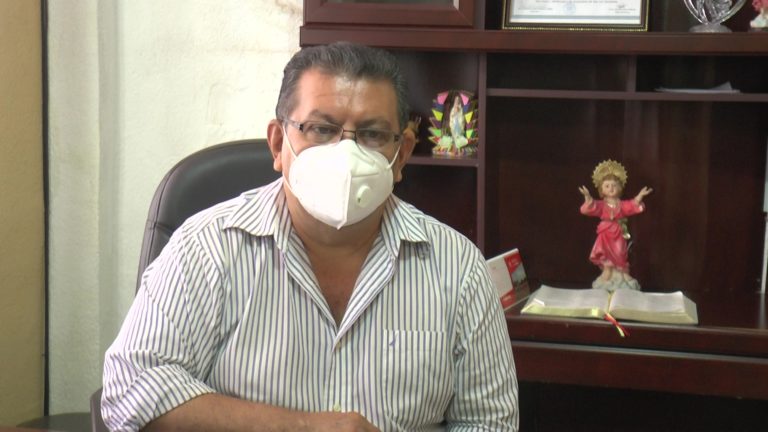 Ernesto Romero, Mayor of San Isidro says that the executive government has not held any meetings to work with municipalities to apply the law of mining prohibition.
Ernesto Romero, Mayor of San Isidro says that the executive government has not held any meetings to work with municipalities to apply the law of mining prohibition.
For his part, the mayor of San Isidro, Ernesto Romero, confirmed that the El Dorado mine closed exploration operations in the Department. Romero resents the lack of coordination by the executive government to comply with the law. “Honestly, everything has remained on paper, only in writing,” he said.
Despite this, Romero mentions that the municipality has opted to support fish farming and beekeeping ventures for about 50 young people from the municipality to prevent them from migrating to the United States. “Now we produce honey which we supply other departments, we even export to other countries. Moreover, we have ordered to build a pond for the farming of fish. Before, we had to wait for them to sell us fish from the rivers”, said the mayor.
Although he does not know about the processes of organic agriculture in the municipality, Romero was in favor of these initiatives: “we know that organic agriculture is very important for all of us, I have noticed that in developed countries they are practicing it a lot (…) It is the healthiest option for our life and our health if we all grow like that. Unfortunately, some farmers opt for the easiest option," he mentioned.
Marvin Pineda, ADES technician, mentions that the coordination between the central and local government is important to foster the promotion of sustainable agriculture.
“Think about the money the government spends on fertilizers annually, on corn and bean seeds. That would not be necessary if they had supported organic agricultural practices for several years. All families would now have their own seeds (…) The municipalities have resources, but do they support this? If this continues, well, we will practically continue with the same unsustainable logic”.
“It is good that the authorities collaborate with us. We need the help of people from the mayor's office and other institutions that can help us with the shortage of supplies related to agriculture. There are things that we have to buy; for example, supplies for compost, seeds are needed, lime. We need their support, as well as ADES collaboration so that they can support us with the expertise of an agronomist to teach us about organic agriculture”, stated María Dubón.
Although there are several families that are satisfied with this type of alternative, others like Alfredo Romero are not yet convinced of its viability for large-scale production.
Alfredo is 77 years old, 60 of which he has dedicated to agriculture. He mentions that at that time he learned to plow the land with oxen but now he uses conventional agriculture. "You don't work like that anymore, you work with poison and that's where poisoned corn comes from."
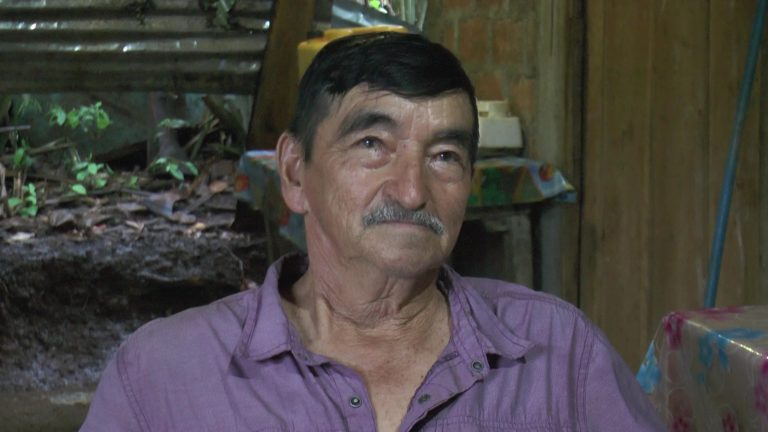 Alfredo Romero, a 77 years old farmer prefers conventional agriculture due to the large quantity of work required for organic agriculture.
Alfredo Romero, a 77 years old farmer prefers conventional agriculture due to the large quantity of work required for organic agriculture.
For Alfredo, the main problem of organic agriculture is the amount of work it requires “I cultivated organic and I saw that it gave me little surplus. You need a large amount, you have to add a good handful (of organic fertilizer) and I realised that you have to work longer hours”.
Can it be replicated?
Omar Arriola, from FAO El Salvador, considers that this type of organic agriculture is a viable and replicable alternative that allows quality of life improvements for the families that practice it. "This allows them to have relief and, as they gain knowledge of the related technology, they enter the different markets and bring sustainability to each practice that is developed in each territory."
It points out that it is important for communities to learn to innovate and develop actions that allow them to enter the local and national market. Achieving sustainable organic agricultural production over time can help a family not depend on another work activity, as in the case of the Reyes-Membreño family.
“There are many people who are very happy. There are some who want to have a vegetable garden at home. I tell them to continue, to have their garden at home because it is healthy to have their vegetables. The challenge we have is to move forward and not fail because have reached a level, but we need to continue buying what is needed, we live for that”, Haydee Membreño.
For ICEFI it is vital that projects promoted by social organizations achieve sustainability and thus avoid codependency; in addition, these programs require adequate intervention by state entities.
“The interventions or projects that an association, that a foundation, that a non-governmental organization can carry out do not replace the obligations of the State because all those projects, in order to be more scalable, to be expanded and have a greater impact in the life of the population have to be accompanied by public policies,” said Lourdes from ICEFI.
For his part, the director of ADES, Antonio Pacheco, reiterates that they will continue with the training processes for families in the Cabañas area, their main commitment is agroecology.
“We are in this effort and we are going to continue, indeed, who does not eat? we eat everything and, therefore, we must fight to guarantee healthy food”. Pacheco added: "We consider that it is necessary to continue developing this type of agroecological activity. Frankly, in the face of global warming and climate change, this is the way to reduce the effects of this phenomenon. We need, as a matter of survival, to continue to learn how to produce healthy food, an approach that contributes to maintaining ecological balance ”.
For his part, Carmelo, whose attention was caught by the mining industry 20 years ago, together with his partner now prepare the land for the production of vegetables and aromatic herbs. Carmelo does not think backward “sometimes when one is stressed, one goes to the orchard and begins to work there, and it changes your mood to know that what you sow will need watering and work, but eventually, you will feel satisfied to reach the plant, harvest it and eat it”.
----------------------------------
Crédits:
Investigation y writing: Angélica Cárcamo, Norma Ramírez.
Revision: Javier Drovetto, Leonel Herrera.
Video production: Romario Aguilar, Angélica Cárcamo.
Podcast: Eduardo González and Angélica Cárcamo.
--------------------------------
* This is part of an article series funded by the Solutions Journalism Scholarship Program of the Gabo Foundation
--------------------------------
Translation from: https://arpas.org.sv/2020/10/del-sueno-del-oro-hacia-la-agricultura-organica/?fbclid=IwAR1Q7DlgKztelf3BgbLNUSMEvjz07DWB1OaA_l50iSR87exh01FGlZZh8X8
Translated by: Giada Ferrucci
